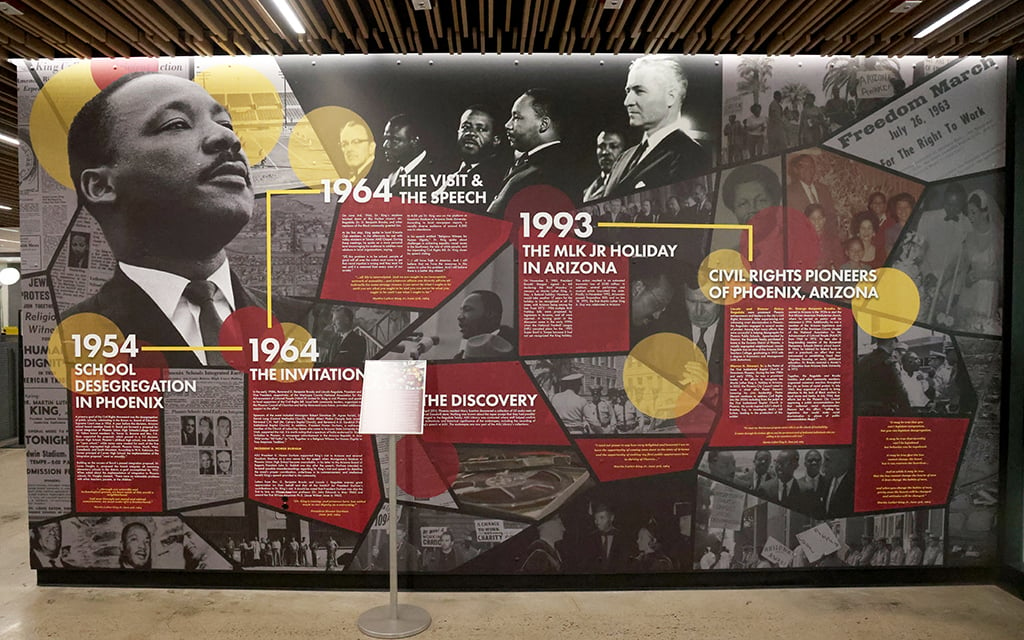
A Dr. Martin Luther King Jr. informational display is on display at Durham Hall at Arizona State University on Oct. 2, 2024. The display aims to commemorate King’s visit to Arizona 60 years ago during the Civil Rights Movement. (Photo by Gabriel Garza/Cronkite News)
TEMPE – An often-forgotten piece of the Civil Rights Movement is Dr. Martin Luther King Jr.’s visit to Arizona in 1964 to champion the Civil Rights Act. In honor of the 60th anniversary of this event, Arizona State University, in collaboration with the Tempe Center for the Arts, spearheaded this celebration with a keynote lecture by Bernice King, the youngest of King’s children.
She urged people to engage with her father’s strategies of nonviolence to change the minds of others.
Bernice King spoke on the fracturing of modern protest movements compared to her father’s time in the 1950s and ’60s. She said she wants to see more people study the work of Martin Luther King Jr. to mobilize around nonviolence and work together under a common goal and message.
“Because we really fervently believe that in order for us to be effective at social change, we’ve got to learn about King and nonviolence and how Daddy and them were able to do what they did,” King said. “Because we can’t keep going around in these circles.”
The purpose of this lecture and event was to remember not only his impact as a national civil rights leader but also his impact on Arizona civil rights and his contributions to the history of ASU.
Martin Luther King Jr. gave his speech, titled “Religious Witness for Human Dignity” to an audience of 8,000 at the ASU campus a few weeks before the Civil Rights Act of 1964 was passed. The speech recording was thought to be lost until being uncovered in 2014. It was played for the audience prior to Bernice King’s lecture.
“For us to be a part of an institution that actually Dr. King came to, but then not even talk about his visit here is quite detrimental to the understanding of civil rights of Black people, of the understanding of how much of an impact this state has had on civil rights, on the understanding of Black history, and the importance of folks realizing and understanding how much history is a part of Arizona history,” said Jessica Salow, assistant archivist of Black Collections at ASU Library. “For us to be able to be here tonight to celebrate this particular event with his daughter is very important and highlights, again, how important that history is to us as Arizonans, but then also Arizona State University and the people who constantly want to learn more about the history of Arizona State University.”
Attendees, local organizations and Bernice King herself stressed the importance of remembering Martin Luther King Jr.’s legacy of peace and unity.
“They staged sit-ins and got beat. They boarded buses and got bombed. They marched in the streets and got clubbed and firehosed,” said Kenja Hassan, assistant vice president for cultural relations at ASU, when addressing the crowd. “They didn’t do all of that just for us to be mulled over by algorithms that contaminate our minds with ignorance and hate.”
After a handful of protest songs played by a band, Bernice King spoke to the audience in the theater. She spoke on the importance of community, nonviolence and continuing her late father’s legacy.
“It’s just what my mother said, which helped me. She says struggle is a never-ending process. Freedom is never really won, you earn it and win it in every generation,” Bernice King said. “It awakened me to the fact that we allowed indifference and we allowed complacency to set in for too long and we got caught up in this individualistic pursuit of our own dreams and ambitions. … We didn’t realize that, collectively, we have a responsibility to continue the freedom struggle, because there’s always going to be these forces in our universe of evil that manifest through people that you can’t destroy.”


